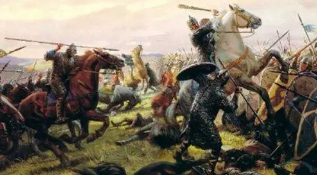- 阅读
- 阅读
- 技巧
- 百科
- 试题
- 文化
- 技能
Culture
文化板块
Book review: The Normans
书评:诺曼人
They stooped to conquer
他们俯身去征服
Empires of the Normans. By Levi Roach.
《诺曼人的帝国》列维·罗奇著

Yet even at what seemed to be the apotheosis of Norman power and influence, the idea of what it was to be one was becoming elusive.
然而,即使在诺曼人的权力和影响力似乎达到鼎盛的时期,这种地位带来的感觉也变得难以捉摸。
By assimilating and marrying wherever they showed up, the Normans willingly blended their identity with the locals’.
通过在他们出现的任何地方进行同化和通婚,诺曼人心甘情愿地将他们的身份与当地人的身份相融合。
By the time of Frederick’s coronation, Normans in England, although still French-speaking, thought of themselves as English.
到腓特烈二世加冕时,英格兰的诺曼人虽然仍讲法语,但他们认为自己是英国人。
Normandy itself had been lost by King John to the French crown, while the multicultural Kingdom of Sicily was now part of the Holy Roman Empire.
诺曼底本身已经被约翰王割让给了法国王室,而多元文化的西西里王国成为了神圣罗马帝国的一部分。
In another 100 years, brooding castles and soaring churches would be the only distinctively Norman features left.
再过100年,阴沉的城堡和高耸的教堂将是仅存的明显的诺曼特色。
Tellingly, the title of Levi Roach’s book is “Empires of the Normans”, not “The Norman Empire”.
值得注意的是,列维·罗奇的书名是《诺曼人的帝国》,而不是《诺曼帝国》。
The grip Rollo’s descendants exerted on Europe and the Middle East was more the result of a militarised diaspora, vaulting ambition and crafty opportunism than of conscious empire-building.
罗洛的后代对欧洲和中东施加的控制,更大程度上是源于军事化的移居、过于雄心勃勃的野心和狡猾的投机主义,而不是有意识地建立帝国。
Even their genuine Christian piety served a practical end.
甚至他们真正的基督教虔诚也有一个实际的目的。
Successive popes lent a cloak of legality to Norman land-grabbing when it suited their political purposes.
历任教皇在符合其政治目的的情况下,为诺曼人的土地掠夺披上了合法的外衣。
Some of the ground covered by the book may be familiar to history buffs: from the high-stakes conquest of England to the fighting qualities that Normans brought to the near-miraculous triumph of the First Crusade.
对于历史爱好者来说,书中涵盖的一些领域可能并不陌生:从对英格兰的高风险征服,到诺曼人带来的战斗品质,再到第一次十字军东征近乎奇迹般的胜利。
But by telling the story from their perspective and following them wherever they went—from Italy to the Balkans and Asia Minor, from England into Wales, Scotland and Ireland and from southern France into Iberia—Mr Roach gives a powerful account of how prowess in combat, shrewd alliance-building, low cunning and sheer chutzpah let them punch above their numerical weight.
但通过从他们的角度讲述故事,并跟随他们从意大利到巴尔干和小亚细亚,从英格兰到威尔士、苏格兰和爱尔兰,再从法国南部到伊比利亚,罗奇有力地讲述了战斗中的英勇、精明的联盟建设、卑劣的狡猾和纯粹的胆识是如何让他们拥有了超过其规模实力的力量。
It is a pity that the narrative sometimes drags as he tracks the exploits of so many Williams, Roberts, Rogers and Henrys (noble Norman families ran a bit short on names).
遗憾的是,当他追溯这么多威廉、罗伯特、罗杰和亨利(诺曼贵族家庭的名字花样有点少)的英勇事迹时,故事有时会拖拖拉拉。
Extraordinary characters such as Roger II of Sicily could have been better dramatised with more direct quotation from the lively primary texts.
如果从生动的原始文本中更直接地引用,像西西里岛的罗杰二世这样的非凡人物本可以更具戏剧性。
For instance, in her “Alexiad”, Anna Komnene, daughter of the Byzantine emperor Alexios Komnenos, is both fascinated and repulsed by Bohemond, the future Prince of Antioch: he is “perfectly proportioned” but a “supreme mischief-maker”.
例如,拜占庭皇帝阿莱克修斯一世·科穆宁的女儿安娜·科穆宁娜在她的《阿莱克修斯传》中,对未来的安提俄克王子波西蒙德既着迷又反感:波西蒙德的“比例很完美”,但却是一个“最大的恶作剧制造者”。
The result is an indelible picture of the warrior-politician.
其成果是对这位战士政治家的一幅难忘的画像。
Mr Roach has diligently mined the sources, but rather fussily deplores their bias and exaggeration.
罗奇孜孜不倦地挖掘了这些来源,却大惊小怪地对其中的偏见和夸大表示谴责。
A flashier historian would have had no such qualms.
更加华而不实的历史学家不会有这样的顾虑。
来源:经济学人
参与评论